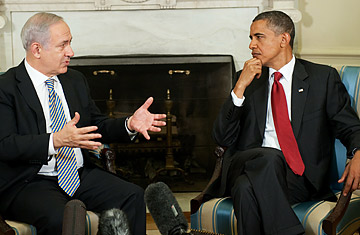
Israel's Prime Minister Benjamin Netanyahu speaks with U.S. President Barack Obama during a meeting at the White House on July 6, 2010
Early in the troubled relationship between Barack Obama and Benjamin "Bibi" Netanyahu, Israeli ambassador Michael Oren told his American counterparts that what was lacking between the two leaders was "intimacy." That word quickly became a touchstone for everything the Israelis wanted but weren't getting from the Obama Administration. Last summer when the two sides were facing off over a U.S. demand that Israel freeze its expanding occupation of the West Bank and East Jerusalem, Netanyahu himself used the word three times in the presence of American diplomats: "What we're looking for is a sense of intimacy, where the trust is there," Netanyahu said, according to those present.
On Tuesday, 18 months after Obama took office, Netanyahu appeared to finally get his desired moment of intimacy. In a carefully scripted Oval Office meeting, he and Obama grinned for the cameras and professed a closeness that none could break. Asked by a reporter whether he trusted Netanyahu after having given him the "cold shoulder" early on, Obama said, "I've trusted Prime Minister Netanyahu since I met him before I was elected President." Obama even walked Netanyahu down to his car and waited for several long seconds until the Prime Minister drove away.
Obama and Netanyahu both have plenty of reason to make nice. The President has been pelted with complaints from Democratic lawmakers channeling fury among some of their Jewish constituents who accuse the Administration of being hostile toward Israel — a fury that lawmakers say has translated into fundraising problems ahead of the election. "The White House claims 80% support among Jews," says one Jewish House Democrat. "But I tell them it's the other 20% we're calling every week for money." Netanyahu, for his part, needs U.S. diplomatic cover from an increasingly hostile international community that seeks to hold Israel accountable for alleged war crimes and collective punishment in Gaza.
The White House meeting seemed to help both men. The powerful American Israel Public Affairs Committee applauded Obama's statements supporting Netanyahu's call for direct talks with Palestinian Authority President Mahmoud Abbas, and said the organization "strongly agrees" with the President's description of the relationship between the two countries. Netanyahu rode into town on two pieces of news, the symbolic loosening of the embargo on Gaza and the prosecution of Israeli soldiers for alleged abuses in Gaza in January 2009. Says one Netanyahu adviser: "The tone was good, the body language was good; I'd say it was picture-perfect."
But despite this week's bonhomie, the two sides remain at odds over policy. Obama wants Netanyahu to take greater steps to reassure Palestinians that it is worth their while to enter direct talks before September, a deadline set by Arab countries for progress and by the Israelis as the end of their partial settlement freeze. And the Israelis' incremental moves on Gaza are not enough to reverse the decline in their relations with Europe and their most important regional ally, Turkey. Netanyahu, for his part, believes Obama still isn't doing enough to pressure Iran over its nuclear program.
The U.S. and Israel have real common interests and in some ways the relationship is stronger than ever, particularly in military and economic cooperation. But political and diplomatic reality is forcing Obama and Netanyahu to pretend to get along even on issues in which they disagree, and that can end up doing more damage than good. If Palestinians think Obama has gone soft on Netanyahu for domestic political reasons, they're unlikely to risk jumping wholeheartedly into a peace process in which their only leverage is the readiness of the U.S. President to pressure the Israelis. If countries that are ambivalent about pressuring Iran see the U.S. in an unconditional embrace with Israel, they may be less inclined to join Washington in tougher actions against Tehran. False intimacy is no substitute for true partnership.
